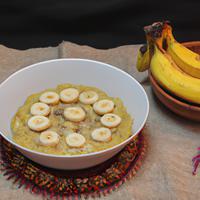
1 serving (250 grams) contains 300 calories, 5.0 grams of protein, 8.0 grams of fat, and 50.0 grams of carbohydrates.

Log this food in SnapCalorie

Nutrition Information
Calories |
283.0 | ||
|---|---|---|---|
% Daily Value* |
|||
| Total Fat | 7.5 g | 9% | |
| Saturated Fat | 1.9 g | 9% | |
| Polyunsaturated Fat | 0 g | ||
| Cholesterol | 0 mg | 0% | |
| Sodium | 377.4 mg | 16% | |
| Total Carbohydrates | 47.2 g | 17% | |
| Dietary Fiber | 5.7 g | 20% | |
| Sugars | 9.4 g | ||
| protein | 4.7 g | 9% | |
| Vitamin D | 0 mcg | 0% | |
| Calcium | 47.2 mg | 3% | |
| Iron | 1.9 mg | 10% | |
| Potassium | 566.0 mg | 12% | |
* Percent Daily Values are based on a 2,000 calorie diet. Your daily values may be higher or lower depending on your calorie needs.
Food Attributes
Source of Calories
About Plantain porridge
Plantain Porridge is a hearty and nutritious dish commonly enjoyed in West African and Caribbean cuisines. Made primarily from ripe or unripe plantains, the porridge is traditionally cooked with ingredients like onions, garlic, palm oil, spices, and protein-rich options such as fish or meat. The plantains provide a rich source of dietary fiber, complex carbohydrates, potassium, and vitamins A and C, supporting digestive health and energy levels. Palm oil, while nutrient-dense with antioxidants like vitamin E, is high in saturated fats and should be consumed in moderation. The dish’s protein elements contribute to muscle repair and maintenance, making it a balanced meal choice when combined with vegetables and herbs. Plantain Porridge is versatile, allowing for variations to suit dietary preferences, and serves as a filling, warming meal. Its nutritional benefits, however, depend on portion size and the specific preparation method.



